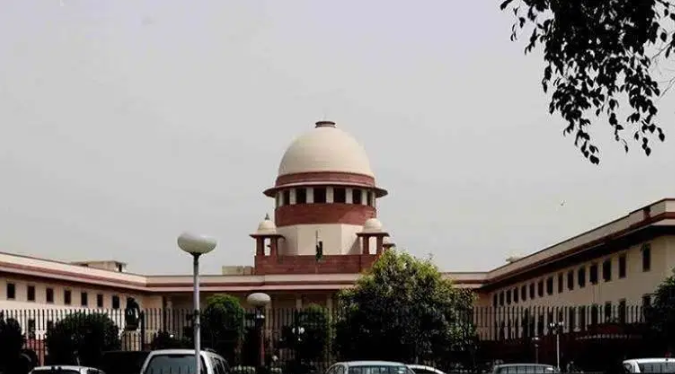SC Scraps New Tribunal Rules, Directs Fresh Look at Passing Laws Dressed as Money Bills

Image Courtesy: The Indian Express
New Delhi: The Supreme Court has put under the scanner the Money Bill route taken regularly by the Narendra Modi-led Bharatiya Janata Party (BJP) government to bypass the Rajya Sabha and to sneak in backdoor legislations through Parliament—from the Aadhaar Act to the amendments made in 2016 to the Foreign Contribution Regulation Act (FCRA) to the 2017 rules regarding functioning of tribunals.
A five-judge bench was adjudicating on a bunch of petitions challenging the constitutional validity of certain sections (Sections 156 to 189) under the amended Finance Act 2017 that were certified as Money Bill and passed in the Lok Sabha—and which change the structures and powers of 19 tribunals to extend executive control of the central government over these quasi-judicial bodies meant for dispute settlement in areas ranging from taxation to green clearance to other domains.
The petitioners also challenged the new rules regarding appointment and service conditions of the members of tribunals as framed under Section 184 of the Act — the Tribunal, Appellate Tribunal and other Authorities (Qualifications, Experience and other Conditions of Service of Members) Rules, 2017.
In its verdict on November 13, 2019, the Supreme Court struck down the rules under Section 184 (while upholding Section 184 itself as constitutional) and directed the Central government to formulate fresh rules regarding the appointment of members to the tribunals.
Until new rules are made, tribunal appointments would be carried out as per their respective parent Acts—ordered the bench that comprised Chief Justice of India Ranjan Gogoi and Justices DY Chandrachud, NV Ramana, Deepak Gupta and Sanjiv Khanna.
However, the five-judge Constitution Bench referred the question of determining the constitutionality of the amended Finance Act 2017 as Money Bill to a larger Constitution Bench.
Was Aadhar Ruling Correct?
All the same, the court also expressed doubt over the correctness of the earlier Supreme Court majority judgement on Aadhaar on September 26, 2018 that had upheld the passage of Aadhaar Act as Money Bill within the meaning of Article 110(1) of the Constitution.
Only the minority judgement of Justice D.Y. Chandrachud had held that the passing of Aadhaar Act as Money Bill was a fraud on the Constitution because the legislation was not a Money Bill.
‘Money Bill’ refers to a draft law that has to do only with the receipt and expenditure of money—such as taxation laws, laws regarding borrowing of money by the government, expenditure from or receipt to the Consolidated Fund of India, laws regarding prevention of black money, and only suchlike.
A Money Bill can be introduced only in Lok Sabha and does not require vote and passage in Rajya Sabha, which can only give recommendations regarding the Bill that the Lok Sabha is free to reject.
The apex court on November 13 held that the majority judgment by the five-judge Constitution Bench in K.S. Puttaswamy (Aadhaar-5) did not delineate the scope and ambit of sub-clauses (a) to (f) under Article 110(1) of the Constitution.
The earlier majority judgment had said that only the main or substantive provisions of an Act should be covered any or all of the sub-clauses from (a) to (f) of Article 110(1) for it to pass the test of being a Money Bill.
The court said the majority judgment on Aadhaar had not substantially discussed or explained the effect of the word ‘only’ in the interpretation of Article 110(1).
“It is clear to us that the majority dictum in K.S. Puttaswamy (Aadhaar-5) did not substantially discuss the effect of the word ‘only’ in Article 110(1) and offers little guidance on the repercussions of a finding when some of the provisions of an enactment passed as a “Money Bill” do not conform to Article 110(1)(a) to (g),” the court said.
“Without expressing a firm and final opinion, it has to be observed that the analysis in K.S. Puttaswamy (Aadhaar-5) 59 makes its application difficult to the present case and raises a potential conflict between the judgements of coordinate Benches.”
Thus, the court referred for examination the matter of the effect and interpretation of the word ‘only’ in Article 110(1) to a seven-judge bench.
The court had to necessarily refer to the Aadhaar judgment for its interpretation of Article 110(1) regarding the status of the challenged provisions (Sections 156 to 189) of the Finance Act 2017 as Money Bill.
Sections 156 to 189 appearing in Part XIV of the Act “can be broken down”—to quote from the November 13 judgment—“into three broad categories”.
“First, abolition and merger of existing Tribunals; second, uniformizing and delegating to the Central Government through the Rules the power to lay down qualifications; method of appointment and removal, and terms and conditions of service of Presiding Officers and members; and third, termination of services and payment of compensation to presiding officers and members of certain tribunals that have now become de-funct.”
A number of lawsuits were filed challenging these provisions—notified on June 1, 2017—under the Finance Act 2017 before the High Courts of Bombay, Madras, Delhi and Gujarat as well as before the Supreme Court.
The Finance Act is notified by the Central government at the beginning of each fiscal year to give effect to its financial policies and proposals for the year ahead. (The Finance Act 2017 was notified on March 31, 2017.)
The 19 tribunals affected by these provisions include the National Green Tribunal; the Income Tax Appellate Tribunal; the Central Administrative Tribunal; the National Company Law Tribunal; the Intellectual Property Appellate Tribunal; the Armed Forces Tribunal; the Telecom Disputes Settlement and Appellate Tribunal; the National Consumer Disputes Redressal Commission; the Debt Recovery Tribunal; the Securities Appellate Tribunal; the Customs Excise and Service Tax Tribunal; and the Film Certification Appellate Tribunal, among others.
The petitioners include the Madras Bar Association, the All India Lawyers Union, the Central Administrative Tribunal Bar Association, the Armed Forces Tribunal Bar Association, the Tax Friends Association (a private company), Roger Mathew and Revenue Bar Association (an international advocacy group of barristers specialising in taxation), Social Action for Forest and Environment (an NGO working for the environment), a retired bureaucrat, a Chartered Accountant as well as former Union minister and Congress leader Jairam Ramesh, among others.
The judgment of the larger Constitution Bench regarding the validity of passage of Finance Act 2017 as Money Bill will lead to a re-examination of the Aadhaar judgment and is bound to have far-reaching consequences.
Get the latest reports & analysis with people's perspective on Protests, movements & deep analytical videos, discussions of the current affairs in your Telegram app. Subscribe to NewsClick's Telegram channel & get Real-Time updates on stories, as they get published on our website.
























